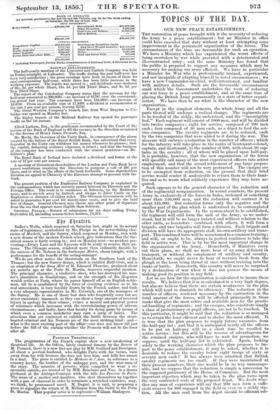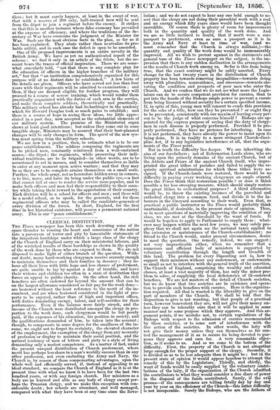TOPICS OF THE DAY.
OUR NEW PEACE ESTABLISHMENT.
THE restoration of peace brought with it the necessity of reducing the Army to a peace establishment ; but no Minister in office could have executed that duty without at least attempting some improvement in the permanent organization of the forces. The circumstances of the time are favourable for such an operation. We have a Ministry which has experienced the worst effects of being overtaken by war while provided with a deteriorated and ill-constructed army ; and the same Ministry has found that the public is prepared to support any measures which may be necessary for making our army efficient. We have in particular a Minister for War who is professionally trained, experienced, and not incapable of adapting himself to novel circumstances ; we have a new Commander-in-chief, well-intentioned, and familiar with military details. Such are the favourable circumstances amid which the Government undertakes the work of reducing our war force to a peace establishment, and at the same time of placing the British Army permanently in a state of better organi- zation. We have then to see what is the character of the new organization.
Except in the simplest elements, the whole Army and all the parts thereof will undergo a radical change. The regiments are to be weeded of the sickly, the undersized, and the "incorrigibly bad." Each regiment will consist of 1000 men, and will be divided into twelve companies ; eight for service, composed of 100 men each ; four composed of 50 men each, as a depot to feed the ser- vice companies. The cavalry regiments are to be reduced, each by the two companies that were added to it during the war. The measure will embrace a reduction in the number of officers ; which for the infantry will take place in the ranks of lieutenant-colonel, captain, and lieutenant, to the number of 600, with about 30 cap- tains in the cavalry ; all of whom will be placed upon half-pay. It is probable, however, that the new organization of the forces will speedily call many of the most experienced officers into active employment, and that the actual retirement of any large propor- tion of this number will not be very protracted. The ensigns are to be exempted from reduction, on the ground that their brief service would render it undesirable to return them to their fami- lies and so to waste what soldierly experience they may have ac- quired. Such appears to be the general character of the reduction and of the regimental reorganization. In round numbers, the present Army is, exclusively of the forces in India, reckoned at something more than 150,000 men, and the reduction will contract it to about 125,000. But reduction forms only the negative and the smaller part of the plan which is understood to be contemplated by the War Departments. In the system about to be established, the regiment will still form the unit of the Army, as we under- stand, but it will be no longer isolated and without relation to the other units, as heretofore : combined with others, it will form a brigade, and two brigades will form a division. Each brigade and division will have its appropriate staff, its own artillery and trans- port. This combined force will be accustomed to a common tn.'
and will, or ought to be, always in perfect readiness to take the field in active war. This is by far the most important change in the organization of the Army. Henceforth, if Ministers carry out their plans, we shall no more hear of an army deficient in transport, or without its complement of artillery and cavalry. Henceforth, we ought never to hear of recruits fresh from the plough or the loom being thrust at once without training into the ranks of battle. Henceforth, this country will never be surprised by a declaration of war when it does not possess the means of making good its position in any field. Let us see how far the organization is calculated to insure these
results. We believe that it is so calculated in a very high degree, but also we believe that there are certain weaknesses in the plan which will tend to diminish its efficiency. The reduction in the number of officers, rendered necessary by the contraction in the total amount of the forces, will be effected principally in those ranks that give the most active and available men for the practi- cal handling of regiments ; and the ensigns, who constitute simply a class of probationary or pupil officers, are not to be touched. In this particular, it might be said that the reduction is so managed as to retain the least efficient and to shelve the most efficient. It is true that the plan proposes to supply future vacancies from the half-pay list ; and that it is anticipated nearly all the officers to be put on half-pay will in a short time be recalled to active service : but this will be the reverse of advantageous for the retained ensigns, who will have to wait for promotion, we suppose, until the half-pay list is exhausted. Again, looking solely to the working character which the plan proposes to im- part to the peace establishment, it may be asked, whether it Is desirable to reduce the cavalry below eight troops of sixty or seventy men each ? It has always been admitted that British cavalry regiments are too small. If they were maintained at their present numbers, their size would be in no way unmanage- able, and we suppose that the reduction is simply a concession to the supposed parsimony of the House of Commons. But the most important objection which may be taken to the plan turns upon the very contracted scale of the proposed depot. We doubt whe- ther any man of experience will say that 200 men form a suffi- cient reserve for 800 engaged in the field or even on a sickly sta- tion. All the men sent from the depot should be efficient sal- diers ; but it must surely happen, at least in the event of war, that with a reserve of 200 only, half-trained men -will be sent from the depot to ,join a regiment before the enemy. It strikes us that this is another instance where false economy has prevailed at the expense of efficiency, and where the traditions of the Se- cretary at War have overcome the judgment of the Minister for War. Such are the most obvious facts in the plan, so far as it has been explained. They abate rather than neutralize its pro- bable utility, and in each case the defect is open to be amended.
One of the proposed improvements is an entire novelty in the British Army. We have as yet no authenticated report of the scheme ; we find it only in an article of the Globe, but the ac- count bears the traces of official inspiration. There we are some- what oracularly told, "not that there is any complete plan for the education of officers in the higher branches of the military art," but that "an institution comprehensively organized for this purpose will at no distant date be established." A few hints of the details are given. Officers who have served not less than four years with their regiments will be admitted to examination ; and then, if they are deemed eligible for further progress, they will proceed to a course of severe training, which would render them practically acquainted with the duties of each arm in the service, and make them complete soldiers, theoretically and practically. This military school has already had its harbinger in the academy which Sir Howard Douglas took so much pains to establish; and there is a source of hope in seeing these ideas, too little appre- ciated in a past day, now accepted as the substantial elements of our military system. The promise of the Ministerial organ shows at least good intentions ; but unless they come out in some tangible shape, Ministers may be assured that their best-planned changes will be only changes in form. The spirit of the new sys- tem must spring from the military schools. We are now in a position, then, to estimate what is to be our peace establishment. The soldiers composing the regiments are to be picked men, constantly reinforced from a well-sustained source—the depot ; the regiments, while preserving their indi- vidual traditions, are to be brigaded—in other words, are to be accustomed to act in masses, and to consider themselves as liable to enter at any moment upon active warfare ; and that they may be so they are to be complete armies themselves on a small scale. Further, the whole army, not as heretofore hidden away in corners, is to live, move, and have its being under the public eye,—a fact that cannot fail at once to render the service morepopular, and to make both officers and men feel their responsibility to their coun- try while taking their reward in the approbation of their country. Each division will be a school for officers and men ; and there will be a model school, so to speak, for the generals, and for those regimental officers who may be called the candidate-generals of every division of the forces. In short, England, for the first time in her historical existence, will possess a permanent national army. This is our "peace establishment."



























 Previous page
Previous page